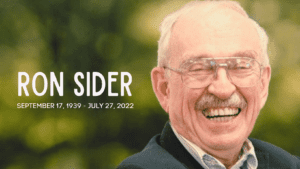 Earlier this month, a group of diverse evangelicals and evangelical-adjacents met in Chicago to celebrate the 45th anniversary of the Chicago Declaration of Evangelical Social Concern, and to try to discern what God’s invitation is to followers of Jesus in this particular time and place.
Earlier this month, a group of diverse evangelicals and evangelical-adjacents met in Chicago to celebrate the 45th anniversary of the Chicago Declaration of Evangelical Social Concern, and to try to discern what God’s invitation is to followers of Jesus in this particular time and place.
Evangelicals have played a confusing role in recent public discourse, and many who identify as “evangelical” don’t recognize themselves in the media’s portrayals of evangelicalism. Many others have chosen to leave institutional evangelicalism altogether, and for still others, such labels mean little to the lived experience of their faith.
45 years ago, the original signers could not have foreseen the impact their statement would make. “It was the first time in maybe the century that evangelicals spent three days talking about social justice,” Ron Sider said in a recent interview. “It was evangelicals talking about the evil of racism, the evil of economic injustice, and the evil of ignoring the dignity of women.” As the founding document for CSA, the Chicago Declaration continues to shape evangelical social justice today.
“…evangelicals spent three days talking about social justice…talking about the evil of racism, the evil of economic injustice, and the evil of ignoring the dignity of women.”
~ Ron Sider
In 1973, older evangelicals made it a point to invite those of the next generation to the convening, in a spirit of passing the baton. The 2018 gathering similarly included eight of the original signers of the 1973 Chicago Declaration (Ruth Bentley, Wesley Granberg-Michaelson, Walter Arthur McCray, John Perkins, Richard Pierard, Ron Potter, Ron Sider, and Jim Wallis) and specifically sought to center the voices of women, people of color, and those under 40.
One of the outgrowths of the 45th anniversary gathering was a lament for the ways in which we have not lived up to the principles of anti-racism, economic justice, and gender equality put forth in the original declaration. Another outgrowth was a sense that the true diversity of evangelicalism is not accurately represented in current mainstream media, combined with a desire to shift and correct that narrative. That goal, in tandem with a call to renew and reaffirm our commitment to the Biblical values and commitments of the 1973 Declaration, led to the creation of the Chicago Invitation.
As the founding document for CSA, the Chicago Declaration continues to shape evangelical social justice today.
“Evangelicals compose an ethnically diverse group whose movement reflects a historical and ongoing commitment to Jesus, the authority of scripture, evangelism, and God’s Biblical call to justice,” the invitation reads. If the “current crises in evangelicalism…jeopardize the reputation and witness of the Christian church,” this invitation is offered as a course correction and a pause for introspection.


